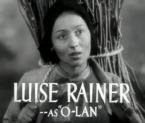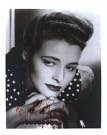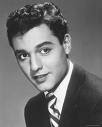Luise Rainer was born on January 12, 1910 in Düsseldorf, Germany. The daughter of Heinz Rainer and Emmy Koenigsberger.

As a young girl, Luise was a terrific athlete, becoming a champion runner and an intrepid mountain climber.
Luise's training began in Germany from the age of 16 by leading stage director Max Reinhardt. After a few years, she became recognized as a "distinguished Berlin stage actress", acting with Reinhardt's Vienna theater ensemble. Critics "raved" at her stage and film acting quality.

She made her first appearance on the stage at the Dumont Theater in Düsseldorf in 1928, followed by appearances at various theaters in Jacques Deval's play Mademoiselle, Kingsley's Men in White, George Bernard Shaw's Saint Joan, Measure for Measure, and Pirandello's Six Characters in Search of an Author.
She later appeared in several German language films before being discovered in 1935 by MGM talent scout Phil Berg. Her first American role was in the film Escapade (1935).
She next appeared in a relatively small part in the musical biopic The Great Ziegfeld (1936). Despite her limited appearances in the film, she "so impressed audiences" that she won the Academy Award for Best Actress. For her dramatic telephone scene in the film, she was later dubbed "the Viennese teardrop".

In her next role, producer Irving Thalberg was convinced, despite the studio's disagreement, that she could play the part of a poor uncomely Chinese peasant in The Good Earth (1937), based on Pearl Buck's novel about hardship in China. She won her second Academy Award for Best Actress for her performance as O-Lan.

Luise Rainer also appeared in The Emperor's Candlesticks (1937) Big City (1937) The Toy Wife (1938) The Great Waltz (1938) and Hostages (1943). Her final film appearance was in The Gambler (1997).
Luise Rainer also appeared in the Broadway productions of The Lady from the Sea (1950) and A Kiss for Cinderella (1942).
Luise has a Star on the Hollywood Walk of Fame for motion pictures.

Luise Rainer accomplished several Academy Award firsts:
1) She was the first actress/actor to win consecutive Oscars.
2) She was the first actress/actor to win two Academy Awards.
3) She was the first actor to achieve the perfect Oscar track record (two nominations-two wins).
4) She was the first and to date only German actress to win an Academy Award.
5) She was the first actress to win an Academy Award for portraying a real-life person (The Great Ziegfeld (1936).

Of all the living winners of a competitive Oscar she has had hers the longest, 74 years.
Currently lives in Eaton Square, London, in an apartment once occupied by Vivien Leigh.
She will be appearing at the Royal National Theatre in London on Monday February 1st, to talk about her extraordinary life and career.

A non-conformist to the MGM star-system, she used to parade around Hollywood untidily dressed, usually with no make-up and wearing pants. Her non-conformist style of behavior cost her contract with MGM in the late '30s
Luise Rainer has been married twice. First to Clifford Odets (January 8, 1937 to May 14, 1940, divorced) and to Robert Knittel (July 12, 1945 to June 15, 1989, his death). She has a daughter, Francesca Knittel-Bowyer, with Robert Knittel.


























